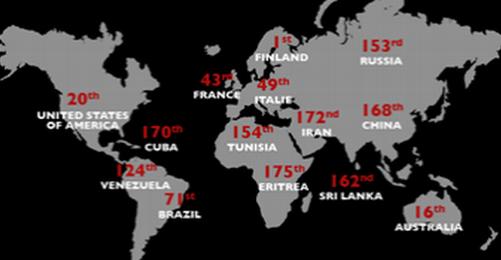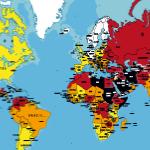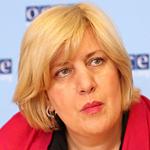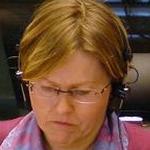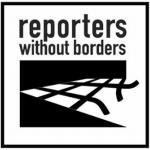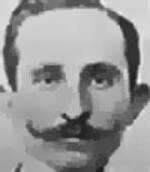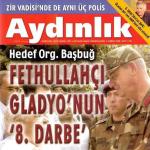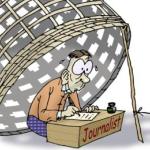The International Reporters Without Borders (RSF) organization published its annual Worldwide Press Freedom Index on Monday. Turkey fell back 20 places compared to last year and ranks on position 122 among a total of 175 countries.
Turkey is one place ahead of Venezuela and shares its position with the Philippines. In 2008 Turkey shared rank 102 with Armenia, which fell back to position 111 in 2009. Northern Cyprus went up to rank 51, Greek Cyprus became 25th.
Newspaper bans and censorship made Turkey lose ground in the index
According to the report,Turkey's big fall was due to a surge in cases of censorship, especially censorship of media that represent minorities (above all the Kurds), and efforts by members of government bodies, the armed forces and judicial system to maintain their control over coverage of matters of general interest.
The index reveals that Turkey and Croatia, 2 candidates for EU membership, experienced dramatic falls. Croatia became 78th and fell 33 places, and Turkey fell 20 places to rank 122.
In Croatia, which hopes to join the EU very soon, certain aspects of Serbo-Croatian relations are a source of tension and are off-limits for the media. Journalists who violate the taboo are often the targets of violence. Organised crime groups have also been responsible for physical attacks on journalists.
Political struggles harmed press freedom in Italy and France
For the first time since 2002, the press freedom index's top 20 is not quite so European. Only 15 of the 20 leading countries are from the Old Continent, compared with 18 in 2008. Eleven of these 15 countries are European Union members. They include the top three, Denmark, Finland and Ireland. Another EU member, Bulgaria, has been falling steadily since it joined in 2007 and is now 68th (against 59th in 2008). This is the lowest ranking of any member of the union.
One of the lowest ranking counties from the European Union is Italy (49th), which got the worst ranking of the EU's six original founders. Il Cavaliere's harassment of the media, increased meddling, mafia violence against journalists who expose its activity and a bill that that would drastically curb the media's ability to publish official phone tap transcripts explain why Italy fell for the second year running.
France (43rd) did not fare much better, falling eight points because of judicial investigations and arrests of journalists and raids on news media, and also because of meddling in the media by politicians, including President Nicolas Sarkozy.
No press freedom under occupation
This is the first time that Israel (internal) is not at the head of the Middle Eastern countries in the press freedom index. The country fell 47 places to 93rd position. Like the United States, Israel has a separate ranking for activities outside its own territory. Israel (extraterritorial) also fell to 150th position. The USA improved 20 places to 20th place and ranks on 108th position for occupied countries likewise.
The region's most repressive countries, Uzbekistan (160th) and Turkmenistan (173rd), have not evolved significantly and their journalists are still subject to censorship, arbitrary treatment and violence.
Russia (153rd) tumbled 12 places, below Belarus for the first time. The reasons for this fall, three years after Anna Politkovskaya's murder, include continuing murders of journalists and human rights activists who help to inform the population, and physical attacks on local media representatives. They also include the return with increasing force of censorship and reporting taboos and the complete failure to punish those responsible for the murders.
Assaults in Armenia, censorship in Azerbaijan
Armenia (111th), fell sharply because of several cases of physical violence against journalists and political tension that continued to affect the media and society.
There was no change in Azerbaijan, where the situation continued to be really worrying. This was clear from the Reporters Without Borders monitoring of press coverage during the presidential election campaign in November 2008 and from the National Television and Radio Council's decision to ban foreign radio stations (BBC, Radio Free Europe and Voice of America) from broadcasting on local frequencies.
Turkmenistan, North Korea and Eritrea bring up the rear of the index. (EÖ/VK)
Source: RSF Worldwide Press Freedom Index.





